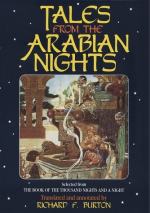[FN#56] A Khan or caravanserai: see vol. i. 266 and Pilgrimage i. 60.
[FN#57] Arab. “Hilm” (vision) “au ’Ilm” (knowledge) a phrase peculiar to this Ms.
[FN#58] The careless scribe forgets that the Sultan is speaking and here drops into the third person. This “Enallage of persons” is, however, Koranic and therefore classical: Arab critics aver that in such cases the “Hikayah” (=literal reproduction of a discourse, etc.) passes into an “Ikhbar"=mere account of the same discourse). See Al Mas’udi iii. 216. I dare not reproduce this figure in English.
[FN#50] Arab. “Auzah,” the Pers. Otak and the Turk. Otah (vulg. “Oda” whence “Odalisque"), a popular word in Egypt and Syria.
[FN#60] Arab. “Al Afandiyah” showing the late date or reduction of the tale. The Turkish word derives from the Romaic Afentis ({Greek}) the corrupted O.G.{Greek}=an absolute commander, and “authentie.” The word should not be written as usual “Effendi,” but “Efendi,” as Prof. Galland has been careful to do.
[FN#61] Arab. “Al-dakhlah”; repeatedly referred to in The Nights. The adventure is a replica of that in “Abu Mohammed highs Lazybones,” vol. iv., pp. 171-174.
[FN#62] Usual in the East, not in England, where some mothers are idiots enough not to tell their daughters what to expect on the wedding night. Hence too often unpleasant surprises, disgust and dislike. The most modern form is that of the chloroform’d bride upon whose pillow the bridegroom found a paper pinned and containing the words, “Mamma says you’re to do what you like.”
[FN#63] Arab. “Akhaztu dam wajhhi ha.”
[FN#64] Arab. “Dilk” more commonly “Khirkah,” the tattered and pieced robe of a religious mendicant.
[FN#65] Arab. “Darbalah.” Scott (p. 24) must have read “Gharbalah” when he translated “A turban full of holes as a sieve.” In classical Arabic the word is written “Darbalah,” and seems to correspond with the Egyptian “Darabukkah,” a tabor of wood or earthenware figured by Lane (M.E. chapt. xviii.). It is, like the bowl, part of the regular Darwaysh’s begging gear.
[FN#66] Vulg. Maghribi. For this word see the story of Alaeddin, Supplem., vol. iii. 31. According to Heron, “History of Maugraby,” the people of Provence, Languedoc and Gascony use Maugraby as a term of cursing: Maugrebleu being used in other parts of France.
[FN#67] In text “Fanarat”; the Arab. plur. of the Pers. “Fanar"=a light-house, and here equiv. to the Mod. Gr. {Greek}, a lantern, the Egypt. “Fanus.”
[FN#68] This Sultan of the Jann preceded by sweepers, flag-bearers and tent-pitchers always appears in the form of second-sight called by Egyptians “Darb al Mandal"=striking the magic circle in which the enchanter sits when he conjures up spirits. Lane (M. E. chapt. xii.) first made the “Cairo Magician” famous in Europe, but Herklots and others had described a cognate practice in India many years before him.




